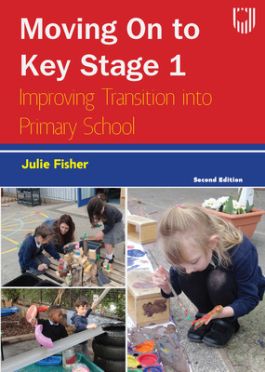Moving on to Key Stage 1: Improving Transition into Primary School, 2e
2nd Edition
0335248853
·
9780335248858
© 2021 | Published: October 16, 2020
Moving On to Key Stage 1 has been highly influential in developing innovative, developmentally appropriate KS1 practice in schools across the country. This new edition offers teachers further powerful and persuasive arguments for continuing play-base…
Read More
Chapter 1: Transition: why there is (still) an issue
Chapter 2: How children learn age 5, 6 and 7
Chapter 3: Preparing children, and adults, for the move to Key Stage 1
Chapter 4: The place of play in Key Stage 1
Chapter 5: Balancing adult-led and child-led learning
Chapter 6: Enabling environments that support different ways of learning
Chapter 7: The role of adults in Key Stage 1 classrooms
Chapter 8: Observation as evidence of learning
Chapter 9: Planning for a developmentally appropriate pedagogy
Chapter 10:Messages from Headteachers to Headteachers
Chapter 2: How children learn age 5, 6 and 7
Chapter 3: Preparing children, and adults, for the move to Key Stage 1
Chapter 4: The place of play in Key Stage 1
Chapter 5: Balancing adult-led and child-led learning
Chapter 6: Enabling environments that support different ways of learning
Chapter 7: The role of adults in Key Stage 1 classrooms
Chapter 8: Observation as evidence of learning
Chapter 9: Planning for a developmentally appropriate pedagogy
Chapter 10:Messages from Headteachers to Headteachers
Moving On to Key Stage 1 has been highly influential in developing innovative, developmentally appropriate KS1 practice in schools across the country. This new edition offers teachers further powerful and persuasive arguments for continuing play-based learning into Year 1 and 2.
This new edition contains:
• Brand new research identifying the current concerns of teachers in KS1 and setting these in the context of the current ‘school readiness’ agenda
• An updated chapter on how children learn most naturally age 5-7 years and how to capitalise on this
• A revised chapter on play, which draws on teacher views about its benefits for KS1 children and the barriers they face in incorporating it into their practice
• A new chapter offering messages from headteachers advocating a play-based approach, and providing examples of how it has raised standards
• A fresh consideration of how to balance adult-led and child-led learning and the role of the teacher in supporting both
The author has a deep understanding of the challenges facing teachers in developing this fusion of pedagogies, and this book offers every reader principled and inspiring ways of meeting these challenges with success.
Julie Fisher is an independent Early Years Adviser and Visiting Professor of Early Childhood Education at Oxford Brookes University, UK. She has been Headteacher of two schools, a University lecturer and a Local Authority Lead Adviser for Early Years.
This new edition contains:
• Brand new research identifying the current concerns of teachers in KS1 and setting these in the context of the current ‘school readiness’ agenda
• An updated chapter on how children learn most naturally age 5-7 years and how to capitalise on this
• A revised chapter on play, which draws on teacher views about its benefits for KS1 children and the barriers they face in incorporating it into their practice
• A new chapter offering messages from headteachers advocating a play-based approach, and providing examples of how it has raised standards
• A fresh consideration of how to balance adult-led and child-led learning and the role of the teacher in supporting both
The author has a deep understanding of the challenges facing teachers in developing this fusion of pedagogies, and this book offers every reader principled and inspiring ways of meeting these challenges with success.
Julie Fisher is an independent Early Years Adviser and Visiting Professor of Early Childhood Education at Oxford Brookes University, UK. She has been Headteacher of two schools, a University lecturer and a Local Authority Lead Adviser for Early Years.
Speech bubbles and reference to real teachers
Summaries

